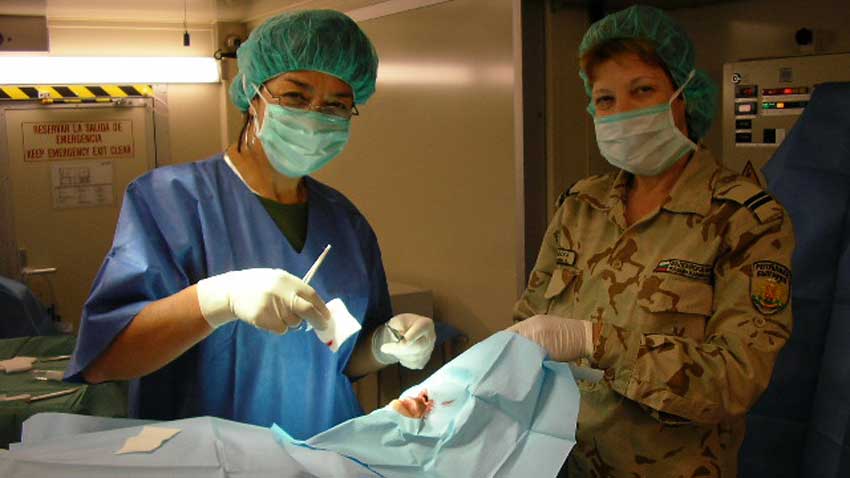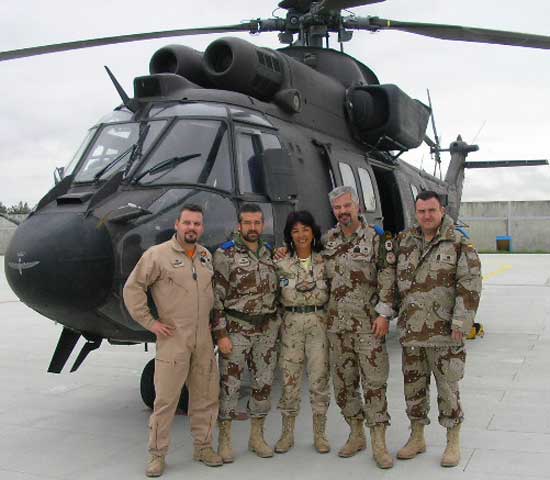“Following your heart is a wonderful thing.” With these words the first woman, head of a surgery unit during a military mission explains the choice she made when she dedicated herself to such a tough profession – abdominal surgery. Dr. Stefka Borissova spent most of her life working at the emergency centre of the Military Medical Academy. She is also a member of the wartime rapid response team.
She says there are no male professions but admits that people’s initial reaction is suspicion. “At our clinic there is a young man who is a male nurse. And there have been times when, starting out on my rounds patients have said to me: “Nurse, can you call the young doctor?” People tend to think that professions that are tough are for men,” says Dr Borissova. She adds that women can cope with any challenge, but what they need is support in raising the children. “A woman must not give up her innate role, that of a mother,” she adds. As to her decision to become a doctor:
“It was a childhood dream of mine and no one has encouraged me. My mother was in commerce. When the other girls were playing with dolls I would be bandaging the other children. Then, on my initiative, when I was in the 4th grade we set up a club “Friends of medicine” and would go and visit different hospitals. We have seen blood transfusions. We invited Prof. Dimitar Paskov, the man who invented the medicine Nivalin, to come to our school. I have always pursued my dream. When I finished school I applied for medicine, but the first time round I didn’t get enough points to be admitted. I then worked as a saleswoman but continued to study and applied one more time. I think we must all pursue our life’s dream and follow our hearts.”

When she was a student in her second year, Dr. Stefka Borissova was already taking on night shifts at the Pirogov emergency hospital. “It was at that time that I learnt to diagnose acute surgical abdomen easily,” she says. But she started out by filling out papers and administering injections. When she was in her third year she performed her first appendectomy and was assisted by a renowned surgeon. But what is the price she had to pay?
“I married while I was at university and had a child with exams coming up and it got really difficult. I graduated and 6 months later I started work at the Surgery Department at the Medical University in Pleven. My son, all dressed in green, would sit on a stool in the operating theatre – he was just over two years old then. I have always stood up for the profession but everything comes with a price.”
 In 1997 during the biggest crisis Bulgaria has been through when the hyperinflation brought monthly salaries down to 10 dollars, Dr. Borissova did her second major - military surgery. Two years later she took part in her first mission.
In 1997 during the biggest crisis Bulgaria has been through when the hyperinflation brought monthly salaries down to 10 dollars, Dr. Borissova did her second major - military surgery. Two years later she took part in her first mission.
“My first mission was humanitarian – in Macedonia in 1999 when Bulgaria set up a base for ethnic Albanians,” she says. “We treated them, fed them, took care of everything. And as there was no hospital, I had to give them surgical examinations, diagnose them and send them to a refugee hospital that was some 50 kilometers away. To begin with I thought I wouldn’t be allowed to give them check-ups because I am a woman. But there would be men lining up all the time. War is a terrible thing, but I have no fears. Fortune favours the brave. Fear is something that grabs and paralyses you.”
Besides in Macedonia, Dr. Borissova has taken part in four missions in Afghanistan. She has worked in Kabul but also at the Spanish field hospital in Herat. “It was really intense there with wounded people brought in from all parts of Afghanistan,” the brave doctor remembers.
English version: Milena Daynova
Photos: private library
The Bulgarian national minority in Albania is one of the largest in the country, according to data from the latest official population census. A total of 7,057 individuals identified as Bulgarians. For comparison, 23,000 people identified as Greeks,..
From today, residents of Stara Zagora, young and old, can send their letter to Santa Claus. A letterbox has been set up in the foyer of the city's State Puppet Theatre to collect messages for Father Christmas. The cultural institution guarantees that..
A Christmas tree with Bulgarian decorations has been placed in a central location at the Griffin Museum of Science and Industry in Chicago. For the fifth consecutive year, Bulgarians living in Chicago crafted the lavish decoration of the Bulgarian..
At the Bulgarian Embassy in London, Prof. Bettany Hughes presented excerpts from the new BBC series - Wonders of Bulgaria. Prof. Bettany..
Over 3.5 million Ukrainians have arrived in or passed through Bulgaria since the beginning of the war. Nearly 200,000 people have found temporary..
An innovation for the treatment of diabetic foot ulcer using the patient's own tissue and artificial intelligence has been implemented at the University..

+359 2 9336 661
